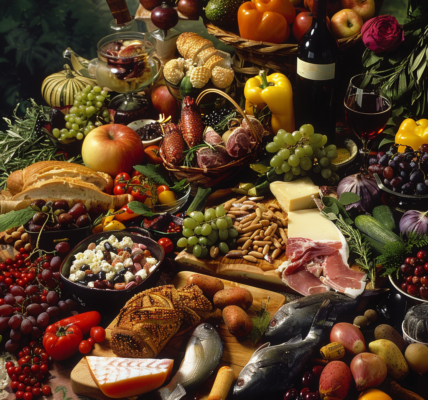Embrace the Seasonal Superfood: Pumpkins for Health and Wellness
As the Halloween season approaches, millions of pumpkins will be transformed into spooky decorations, with over 30 million carved pumpkins expected to grace doorsteps and windows across the UK. However, many of these vibrant vegetables are often discarded shortly after the festivities, leading to significant food waste and missing out on their nutritional benefits. Chef Emily Gussin highlights that pumpkins are not just for decoration; they are a versatile and nutritious food that can enhance a variety of dishes, from hearty soups to delightful desserts.
With their sweet, nutty flavor and crunchy, nutrient-rich seeds, pumpkins deserve a place in our diets. Health experts are advocating for increased consumption of this seasonal superfood, sharing insights into how we can fully harness the health benefits of pumpkins. Here are some compelling reasons to incorporate more pumpkin into your meals this autumn.
1. Promotes Healthy Skin
Pumpkins are a rich source of beta-carotene, the pigment responsible for their vibrant orange color. According to Rob Hobson, a registered nutritionist and author of Unprocess Your Family Life, our bodies convert beta-carotene into vitamin A, which is essential for maintaining healthy skin. An 80g serving of pumpkin can provide approximately 42% of the recommended daily intake of vitamin A, making it an excellent choice for skin health. Vitamin A aids in cell production and repair, helping to keep skin looking youthful and vibrant.
2. Supports Immune Function
Pumpkins are packed with vitamins and antioxidants that can significantly boost our immune systems, particularly during the colder months when they are in season. Vitamin A plays a crucial role in the production and function of white blood cells, which are essential for fighting infections. Additionally, it helps maintain the integrity of skin and mucosal barriers, such as those found in the respiratory and gut linings, acting as a primary defense against pathogens.
Moreover, pumpkins contain vitamin C, contributing approximately 9% of our daily needs, which further supports immune function. Pumpkin seeds are also rich in zinc, a vital mineral for immune cell function and wound healing, as noted by Hazel Flight, a nutrition and health program lead at Edge Hill University.
3. Enhances Heart Health
The flesh of pumpkins is an excellent source of potassium and fiber, both of which are beneficial for heart health. These nutrients help regulate blood pressure and cholesterol levels, two key risk factors for heart disease. Additionally, pumpkin seeds contribute to this heart-healthy profile, as they are loaded with monounsaturated and polyunsaturated fats that can increase levels of “good” high-density lipoprotein (HDL) cholesterol while decreasing “bad” low-density lipoprotein (LDL) cholesterol.
4. Aids in Weight Management
Pumpkins are low in calories yet high in fiber, making them an ideal food for those looking to manage their weight. The fiber content helps promote a feeling of fullness and can aid in digestion, making it easier to maintain a healthy diet. Incorporating pumpkin into meals can add volume without adding excessive calories, allowing for satisfying and nutritious dishes.
5. Versatile Culinary Uses
Pumpkins can be utilized in a variety of culinary applications, making them a versatile ingredient in the kitchen. From savory dishes like pumpkin curry and roasted pumpkin soup to sweet treats such as pumpkin pie and muffins, the possibilities are endless. The seeds can also be roasted for a crunchy snack or added to salads for extra texture and nutrition.
6. Rich in Antioxidants
Pumpkins are rich in antioxidants, which help combat oxidative stress and inflammation in the body. These antioxidants, including beta-carotene, vitamin C, and vitamin E, play a significant role in protecting cells from damage caused by free radicals. By incorporating pumpkins into your diet, you can enhance your body’s ability to fight off chronic diseases and promote overall health.
7. Easy to Prepare and Cook
Preparing pumpkin is easier than many might think. Fresh pumpkin can be roasted, steamed, or pureed, and it can be used in both sweet and savory recipes. Canned pumpkin is also a convenient option, providing a quick way to add pumpkin to your meals without the hassle of preparation. Whether you’re making a comforting soup or a delicious dessert, pumpkin can be a simple and nutritious ingredient.
8. Seasonal Availability
Pumpkins are in season during the autumn months, making them a timely and fresh addition to your diet. Shopping for seasonal produce not only supports local farmers but also ensures that you’re getting the freshest ingredients available. During this time, you can find a variety of pumpkin types, including sugar pumpkins, which are ideal for cooking and baking.
9. Nutrient Profile of Pumpkin Seeds
Don’t overlook pumpkin seeds, also known as pepitas, which are a powerhouse of nutrition. They are an excellent source of magnesium, zinc, and healthy fats. Magnesium is essential for many bodily functions, including muscle and nerve function, blood sugar control, and blood pressure regulation. Including pumpkin seeds in your diet can enhance your overall nutrient intake and provide additional health benefits.
10. Sustainable Eating
Embracing pumpkins as a food source also aligns with sustainable eating practices. By utilizing the whole pumpkin, including the flesh and seeds, you can minimize food waste and make the most of this seasonal vegetable. Additionally, pumpkins are relatively easy to grow, making them a sustainable crop that can be cultivated in various environments.
As you prepare for Halloween and the autumn season, consider the nutritional benefits of pumpkins. By incorporating this versatile superfood into your meals, you can enjoy delicious dishes while reaping the health benefits that pumpkins have to offer. Whether you choose to roast them, bake them, or blend them into smoothies, pumpkins are a delightful and nutritious addition to any diet.





